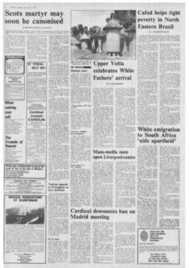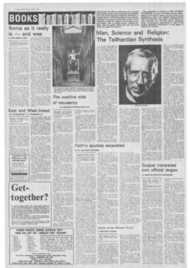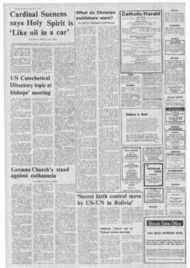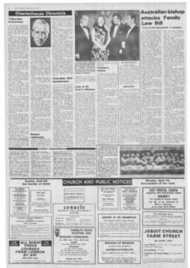Page 3, 4th April 1975
Page 3
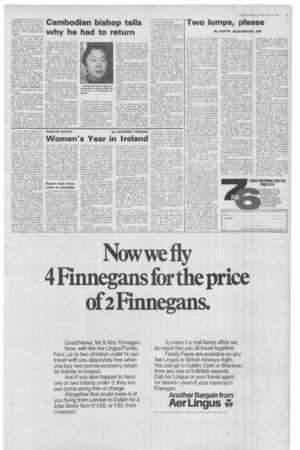
Report an error
Noticed an error on this page?If you've noticed an error in this article please click here to report it.
Tags
Share
Related articles
Irish Lighten Woman's Lot
Sisters Seek Greater Role In Church
World Bulletin
Ireland Has More Men Titan Women
Little Change In Church Attitude To Women
Women's Year in Ireland
If it has done nothing else, International Women's Year in Ireland has brought to the fore the puzzled questions of a lot of well-meaning Irishmen. The fact that women are discriminated against on almost every level of Irish society had never occurred to most of them, and when Women Libbers tried to out-talk a male colleague or the television interviewer most men would say "That's no way for a woman to talk." The Women's Liberation Movement is still referred to as "That lot who burn their bras."
There are literally dozens of organisations in Ireland working towards the removal of some injustice or discrimination in society. The louder they shout and the more fuss they make the more chance they stand of something being done on the official level.
The Women's Aid group, taking their cue from Erin Pizzy, who started the first refuge for battered wives in England, took a year's lease on a house near St Stephen's Green in Dublin. The house was in a bud condition when they acquired it, but the women who live in it and outside helpers have repaired, painted and made it into a habitable half-way house.
The group has managed to change the acceptecl position that every woman must stay with her husband. By dragging
the abuse that some women have to endure into the full glare of Press, TV and radio the public now accepts that these abuses take place and the idea that a wife must stay with her husband "through thick and thin" is beginning to weaken.
Women's Aid, which depends on voluntary funds, has had many sleepless nights wondering how it could buy the house before its lease runs out next month. Now Dublin Corporation has bought it for them.
Report took three years to complete
The report on the Status of Women was completed in December 1972 and published in May 1973. It took three years to complete, was heralded throughout Ireland as a "major breakthrough" and as "the most far-reaching and in-depth document ever produced about women." Perhaps it was, but little has happened since then.
Mr O'Leary, the Minister for Labour, must have found himself in a pretty tight corner, when so much pressure was being applied on him to "do" something for women. The traditional way out, setting up a committee, had already been taken and had done the job so well that there was no way that he could appoint another committee to do the same thing. However, he did appoint another committee, but this time it was an "advisory committee". It would act as a link between the various women's groups and the Minister, it would also prepare submissions and carry on pilot studies in cases of discrimination.
In fact, he created a buffer zone, which should ensure complete inaction until the next General Election. No doubt, women still won't be able to join their local libraries without their husband's_ signatures on the application forms and husbands will still fill in and sign application forms for children's allowances.
In common with other countries, Ireland has set aside a specific sum of money for Women's International Year. When I, as a journalist, asked at the Department what the sum was, 1 was told that it could not be revealed.
However, I was assured that should anyone apply to the fund for a specific project to do with Women's Year, they would be accommodated. As few, if any, of the women's groups know of the fund's existence, at the end of the year Mr O'Leary will presumably be able to say that there couldn't be much wrong with women in Ireland today as the fund which he had specifically set aside for their use in Women's Year had not even been touched!
A surprising ally to rally in support of women (and from a quarter, which in itself could be reckoned to be the most obstinate upholder of discrimination against women — the Catholic Church) Fr Donal Flanagan, Professor of Theology at St Patrick's College, Maynooth, wrote recently of "The Role of Religion in Discrimination against Women."
He wrote: "Religion in Ireland is in fact the ultimate source and sanction of many of those traditional discriminatory male thought patterns which exist undetected in the Irish mind."
He asks whether "the time has now come for Christian religious institutions to acknowledge publicly that they have denied women equality with men and have organised themselves in a way which has excluded women from effective participation in shaping the church." , He goes on to say thia a solemn admission from the major Christian religious bodies that they have for centuries systematically discriminated against women would be a timely document in International Women's Year 1975.
Fr Flanagan finishes by saying "the Roman Catholic Church whose Holy Year coincides cides with Internatio al Women's Year might cons br the possibility of dropping he tactic of equalisation ,Illy canonisation and introduce some reforms which would remove at least from her official documents, canonical, liturgical, and theological the unacceptable references to women found in them. It would perhaps be asking too much to expect a formal repudiation of Aquinas."
It will be interesting now to see whether Fr Donal Flanagan's views will be written off or dismissed as just the views of another "crank priest." But you can't dismiss the Professor of Theology at Ireland's major seminary, Maynooth, that lightly.
blog comments powered by Disqus



